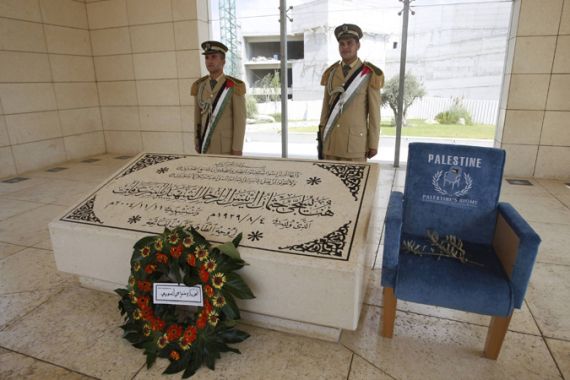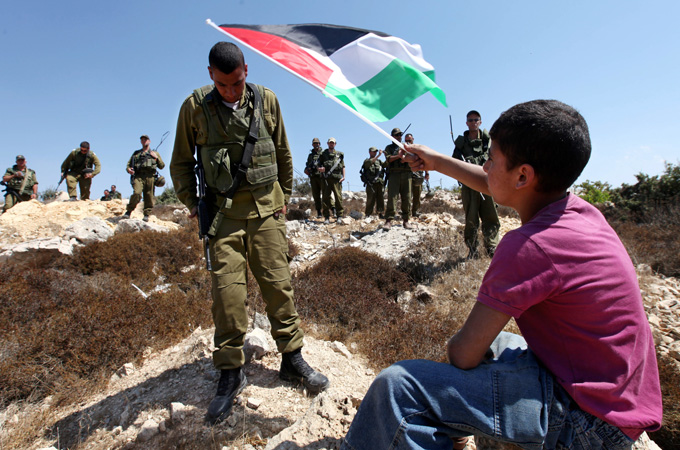Who can represent Palestinians at the UN?
As the bid for statehood at the UN draws closer, legal scholars wonder who has legitimacy to represent Palestinians.

 |
| Palestinians both outside the Occupied Territories and within demand legitimate representation [EPA] |
A new legal finding has revealed the risks regarding representation and self-determination if Palestinians declare statehood at the United Nations later this month.
Following his legal opinion released last month, which sparked an intense debate between supporters and detractors of the bid for statehood, professor Guy Goodwin-Gill has expanded on the potential challenges facing Palestinians. The full text of his new finding can be found here.
The lack of direct participation of Palestinians both within the diaspora and within the Occupied Territories will only create further fragmentation due to a lack of legitimate representation, according to Goodwin-Gill, a professor of international law at Oxford University. One of the solutions he proposes is the introduction of elections by all Palestinians towards an organisation recognised and representative of all.
“I think it is clear that my analysis of the issues is not about the bid for statehood as such, the advantages and disadvantages of which are now much discussed,” Goodwin-Gill told Al Jazeera. “Rather, it is about ensuring the best and most representative mechanisms for ensuring the protection of the rights of all the people of Palestine.”
‘Expression of the popular will’
In his new finding, which he wrote as a response to the fierce debate generated by his first opinion, Goodwin-Gill stated:
| “The move to enhance the Palestinian presence in the United Nations through ‘statehood’ nevertheless carries the risk of fragmentation – where the State represents the people within the UN and the [Palestinian Liberation Organisation] represents the people outside the UN. Such a division of representation would run counter to the status quo and to the original intent of the international community recognising the PLO … The bottom line, however, remains the will of the people, and any substantive change in the present institutional arrangements for representation calls for approval through an expression of the popular will, followed by international recognition equivalent to that given to date, for example, by the General Assembly and the Arab League.” |
Although it will be the PLO as an institution which will be presenting the bid for Palestinian statehood on September 20 at the UN Security Council, it is the Palestinian Authority (PA) that is pushing the case forward.
The PLO is the sole official representative of the Palestinians at the UN. The PA was created from the 1993 Oslo Accords, a failed peace agreement, as a temporary body to administer the occupied territories.
Many have predicted that this bid will be vetoed by the United States, which, along with Israel, opposes the unilateral move to declare statehood. The two countries have been working hard in recent months to stop the bid from reaching the UN, with both nations claiming that a Palestinian state can only be achieved through negotiations. If vetoed, the Palestinian team is hoping the bid will be moved to the General Assembly for a vote. It is reported that between 130 and 140 member states at the UN will endorse a Palestinian state, more than the necessary two-thirds needed for the ratification of the bid.
The PA is not recognised by many within the diaspora as a legitimate representative of the Palestinians, as it is a temporary administrative body whose authority lies solely within the West Bank and Gaza. The presidency of the PA is still held by Mahmoud Abbas, even though his term expired in January 2009, further adding to the arguments of illegitimate representation.
Karma Nabulsi, a scholar at Oxford University and former PLO representative, found it necessary to focus on the findings of Goodwin-Gill. She has appealed on a number of occasions to those presenting the statehood bid to reassess their position. “We have been informed by our officials that the initiative will advance our rights to self-determination,” she told Al Jazeera. “However, as it is currently constructed, this initiative does not actually advance or protect this collective right of the Palestinian people.”
Uncertainties and implications
Others have also called for the PLO to clarify the terms of the statehood bid. A statement released by the Al Dameer Association for Human Rights in Gaza on Wednesday stressed that “‘the September claim’ cannot be justified when seeking to implement a step of this significance, and that ignoring the principle of community participation in building this initiative raises a lot of queries”.
Furthermore, the statement asked for transparency on the issue, calling on Mahmoud Abbas “to announce and disclose all official information about the nature, importance, hypothesis, and implications of going to the UN and getting recognition of an independent Palestinian state”.
Hind Awwad, an activist based in the West Bank with the Palestinian campaign for democratic popular representation, told Al Jazeera that “we have yet to receive clear public assurances from the Palestinian leadership that the September initiative will preserve the PLO at the UN, and therefore protect and advance the inalienable rights of the Palestinian people”.
“Although we are lacking clarity on what the initiative is, in its current form it will replace the PLO as our representation at the UN with the Palestinian State (which is not yet liberated),” she said, “thereby disenfranchising the majority of our people”.
“The PLO belongs to the Palestinian people in their different places of existence, and its observer status and international recognition at the UN is a huge achievement that only came after years of struggle by our people,” said Awwad. “Therefore, the people must be the ones to decide the fate of the PLO; it cannot be a decision the current leadership takes without any mandate from the people themselves.”
How will the State be representative?
In its current form, consequences of the bid could be severe, Nabulsi said. “Palestinian people as a whole stand to lose the most out of this, as it shatters their long-held and internationally-recognised unity in their struggle for their inalienable rights. Replacing the PLO with the State as the representative of the Palestinian people at the UN creates many problems.”
One of these problems is that the recognition of a state under current conditions creates two separate representatives of the Palestinian people. “This not only separates the people from each other institutionally, but it also disenfranchises over half of them from their ability to claim these rights under a single representative at the proper international forum for these claims, the United Nations,” she said.
Many who still support the statehood bid responded to Goodwin-Gill’s previous opinion, claiming that safeguards had been installed as early as the 1980s to protect the rights of the Palestinians if statehood were to happen. They added that there would be a transfer of authority from the PLO to the State of Palestine, and that the concerns aired by Goodwin-Gill and company are unfounded.
Goodwin-Gill, however, highlights the fact that there are few, if any, mechanisms currently in place to guarantee proper representation for all. As he stated in his recent finding: “Who will represent the people of and in the State? Of what value, democratically, are historical declarations of intent? Or assertions of present authority? Or the status quo?”
“People’s expectations of government have moved on and, in my view, democracy requires institutions and mechanisms to allow their functioning and change.”
Follow Nour Samaha on Twitter: @Samahanour